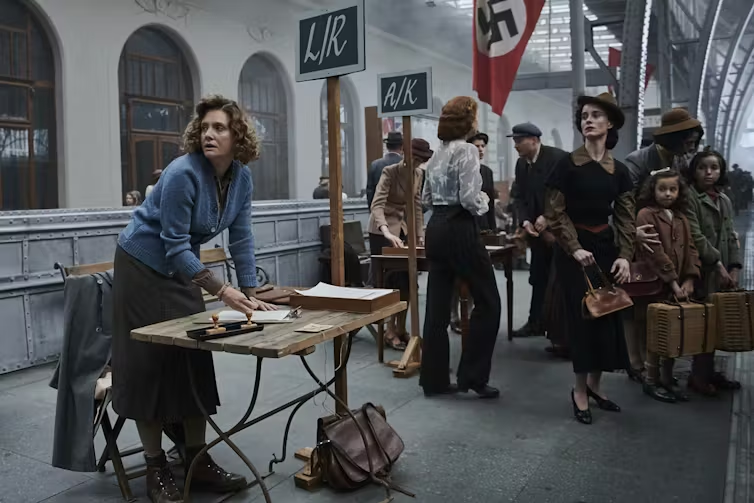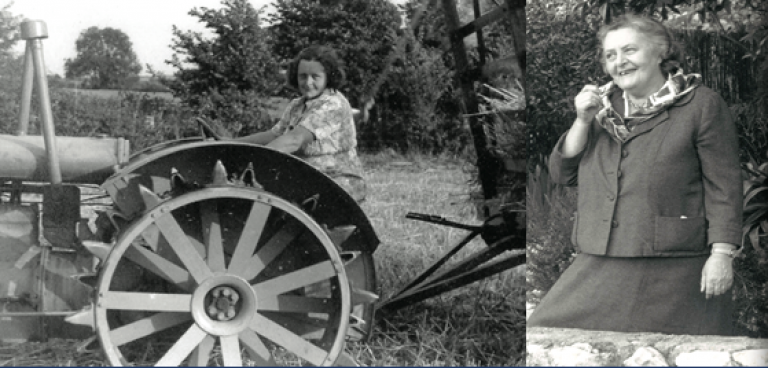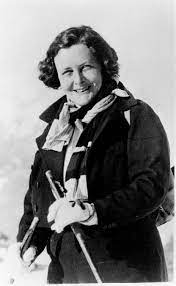On the 18th June, Somerville College will mark Refugee Week by hosting a screening and Q&A with the team behind the 2023 film One Life. But why have we chosen this particular film to commemorate our work as a College of Sanctuary?

Romola Garai as Doreen Warriner. Credit: Warner Bros
One Life tells the story of Nicholas Winton, the 29-year-old British Jewish stockbroker who famously organised the kindertransport which evacuated 669 Jewish children from Nazi Germany to Britain in 1939. As a moving testament to the power of sanctuary, the film has clear relevance to a Somerville audience. However, it turns out that One Life also has several direct and meaningful connections to theCollege.
First off, the screenplay to One Life was co-written by Lucinda Coxon (1981, English), a Somerville alumna and award-winning writer for both screen and stage, whose credits include The Danish Girl and The Crimson Petal and the White. The films also depicts, in its final scenes, the famous moment in which Esther Rantzen (1959, English) brings to light Nicholas Winton’s heroism during a 1988 episode of That’s Life by introducing him to a room full of the grown-up children he had helped to escape from Czechoslovakia back in 1939.
Perhaps most arrestingly, the film features a show-stopping portrayal of Doreen Warriner, brought to life here with pitch-perfect clarity by Romola Garai. The film relates how Warriner, as head of the British Committee for Refugees in Czechoslovakia, first alerted Nicholas Winton to the desperate plight of refugee families – an act Winton himself was always keen to acknowledge in later years. Doreen Warriner is herself thought to have saved 15,000 refugees from Nazi persecution in Germany between 1938-39, a feat for which she was awarded the OBE in 1941, and posthumously in 2018 the British Hero of the Holocaust Medal.
Doreen Warriner was perhaps an unsuspecting candidate for a humanitarian. Born into a Warwickshire farming family, her first in PPE from St Hugh’s had seemed to place her firmly on the academic track. After Oxford, she went to London to read for a doctorate at UCL’s School of Slavonic and East European Studies, with a thesis on the German industrial organisation since the war.

Doreen Warriner in later life (right) and showing active interest in her lifelong study of agricultural reform and peasant farming. Credit: UCL School of Slavonic and Eastern European Studies
It is at this point that her course began subtly to change. Warriner was forced to break off her studies in London, writing later to Somerville that, “I worked in London at the British Museum & School of Economics until March 1927, when I was obliged to resign the studentship for domestic reasons and to work at home, more or less unsystematically.”
The next year, Warriner applied for a Mary Somerville Research Fellowship. Having been unanimously elected to this post by the Committee, Warriner thereupon embarked for central Europe to start collecting her research into the changing industrial conditions of the region.
During 1928-29, Warriner evidently became more and more fascinated by what she was seeing in Germany and, even more so, Czechoslovakia. By the summer of 1930, she was writing to Somerville to request that she be allowed to remain in Prague during the Michaelmas term of 1930 to continue her research there. She wrote to the Committee: “The difficulty is not that I cannot arrange to work in Oxford at all, but that I cannot arrange to just at this stage. To return in September would mean breaking off all my personal connections here and therefore losing all my opportunities for getting first-hand information.”
The justification Warriner gives here clearly suggests that the young economist had a natural instinct for gaining intelligence and maintaining influence – both qualities that would prove invaluable in her later work as an organiser of the refugee evacuation. She also clearly loved the Czech people. When she wrote a further letter to Somerville College asking whether the Committee would support her in expanding the scope of her study to consider the social and cultural elements underpinning her revised thesis, she justified it because, “the situation here is so interesting from a social and cultural point of view.” She added: “Perhaps the Committee would not object if I made some sort of study of these aspects as well, because though not strictly scientific in interest, they throw a lot of light on the economic situation.”
Somerville College responded warmly to this and other requests Warriner made. As Chair of the Mary Somerville Research Fellowship Committee, then-Principal Helen Darbishire wrote to Warriner: “As to your plans for next year, we realise the short time you have had to put together materials…[Therefore] I think the Committee would be prepared to give you leave to have one of three terms away…That is what we should all like best.”
Similarly, when the focus of Doreen Warriner’s thesis changed, from German industrial organisation to the growing economic unity between Germany and Czechoslovakia, Somerville College was yet again there to support her. Helen Darbishire noted the change in topic and added, “We should very much like to see your thesis, in the hope that we may find some money to help with the publication. We have not actually a fund for publishing, but there is a reserve fund which could be drawn upon under special circumstances.”
Letter from Helen Darbishire to Doreen Warriner, May 1930 (1 of 3)
Letter from Helen Darbishire to Doreen Warriner, May 1930 (2 of 3)
Letter from Helen Darbishire to Doreen Warriner, May 1930 (3 of 3)
Letter from Helen Darbishire to Doreen Warriner, offering advice on publishing her thesis, Oct 1930
Correspondence from Helen Darbishire to Doreen Warriner. Images 1-3 are a letter on behalf of the Committee, dated May 1930; letter 4 is a personal note dating to Oct 1930. Credit: Somerville College
When the new thesis was finally completed, Warriner again wrote to the Principal of Somerville to ask for advice about its fitness for publication. Helen Darbishire duly consulted Alexander Lindsay, Master of Balliol, and a History Fellow at Somerville, reporting back that: “The Master [of Balliol] thinks that, with one change which he suggests, it is fit for publication and should, because of its topical interest, be published at once.”
Helen Darbishire even advised Doreen Warriner about the terms under which her new thesis should be published: “I have consulted the Master of Balliol about this offer of P.S. King & he thinks, as I do, that it is as good an offer as you will, and not an unfair one, as these things go.” The Principal seems to have been at pains to help Doreen as much as possible, adding: “He thinks that if you cut the book down, weeding out the tables of statistics and a good deal of the technical details, & making the general ideas as prominent as possible, that it stands a chance of attracting attention & winning good sales, since the subject of Rationalisation is so much in the air now.”
Doreen Warriner was deeply grateful for all this advice. She wrote to the Committee in 1931, saying: “I should like to express my deepest gratitude to the committee for giving me the opportunity to undertake research, for their kindness in permitting me to change the subject and to extend my stay in Prague, and for their interest in my work.” She ended her final report to the Committee saying, “I hope to be able to continue with research work of the same kind as I have been doing for the last three years.”
In many ways, that wish came true with a greater depth and urgency than Doreen Warriner could ever have foreseen in the days before Nazism rose to its full terrible prominence, and small groups of people across Europe saw the need to come together and fight back. It is humbling to see the small, yet important, role that Somerville College played in supporting Doreen Warriner’s growth into the fearless humanitarian she would in time become.
You can read more about Warriner in the excellent brief survey of her life which is provided here.

Doreen Warriner, courtesy of Henry Warriner